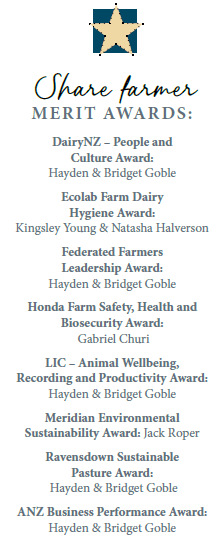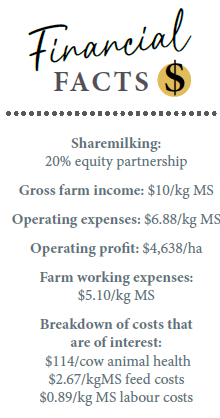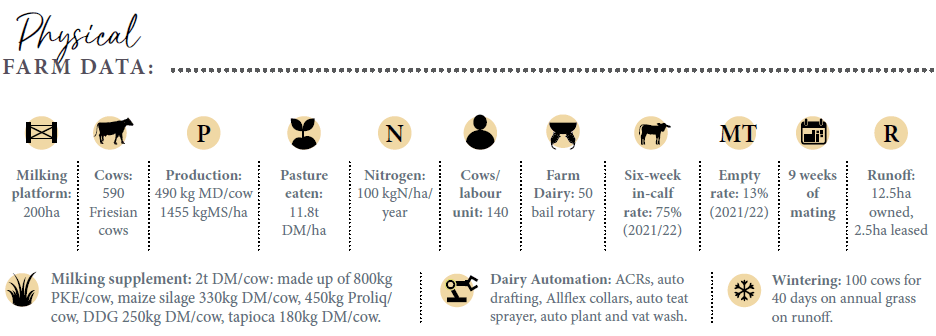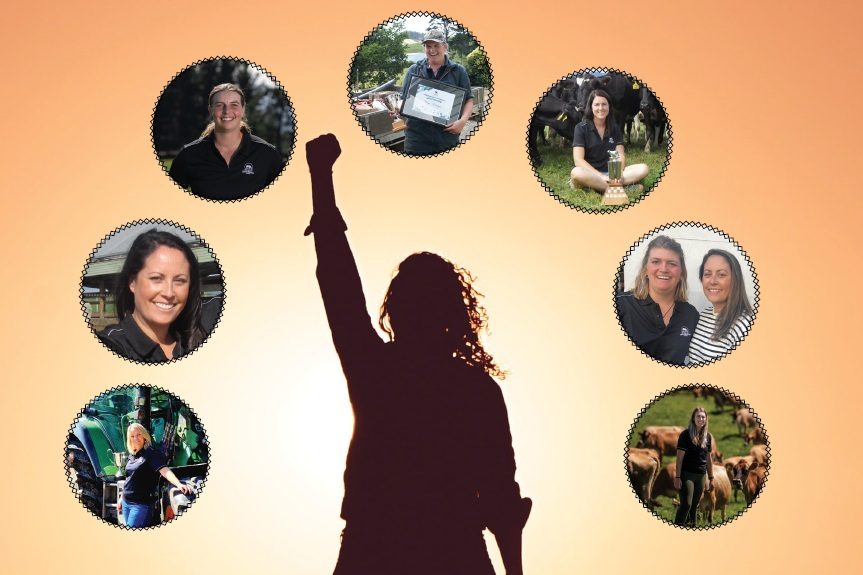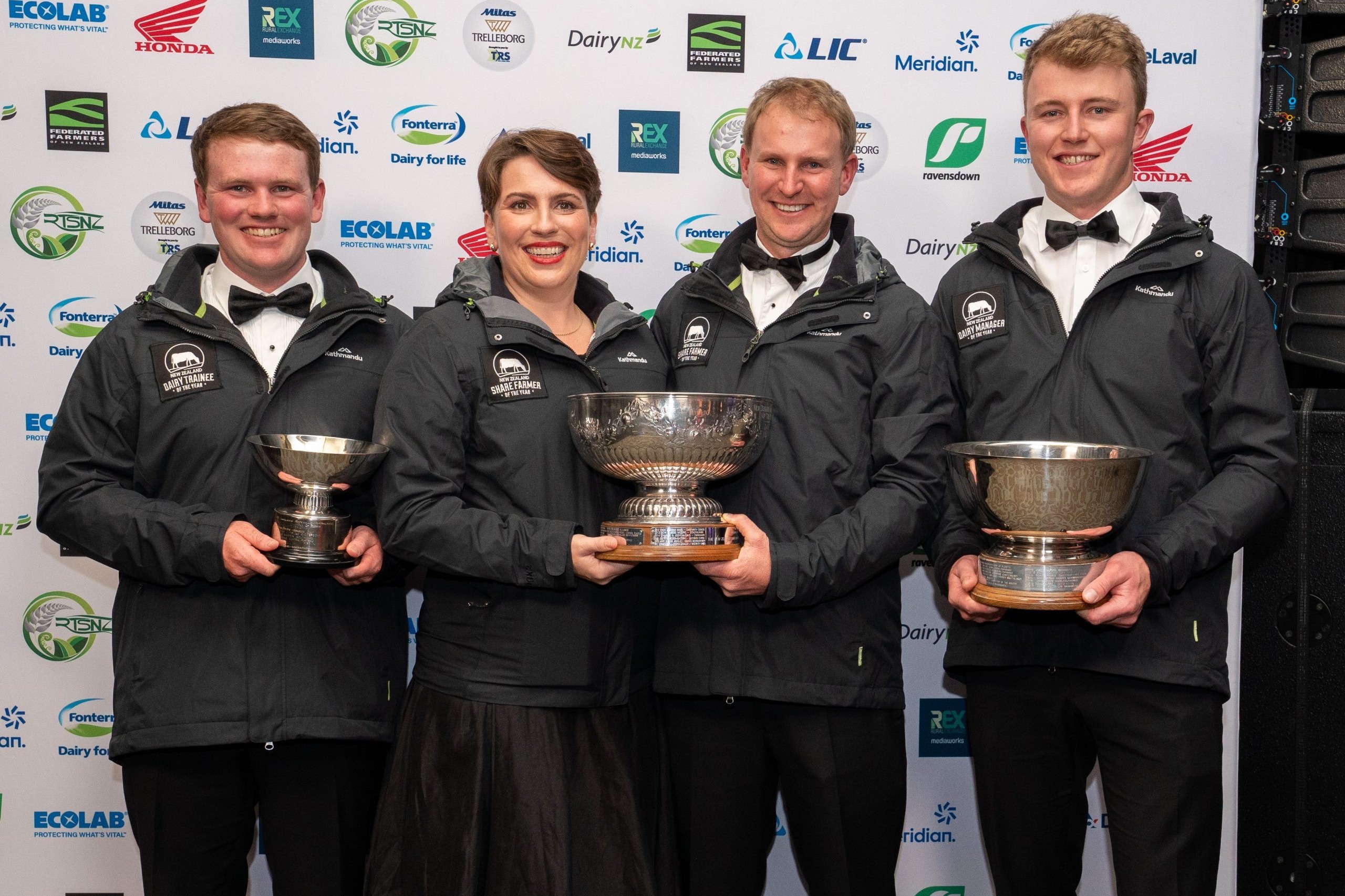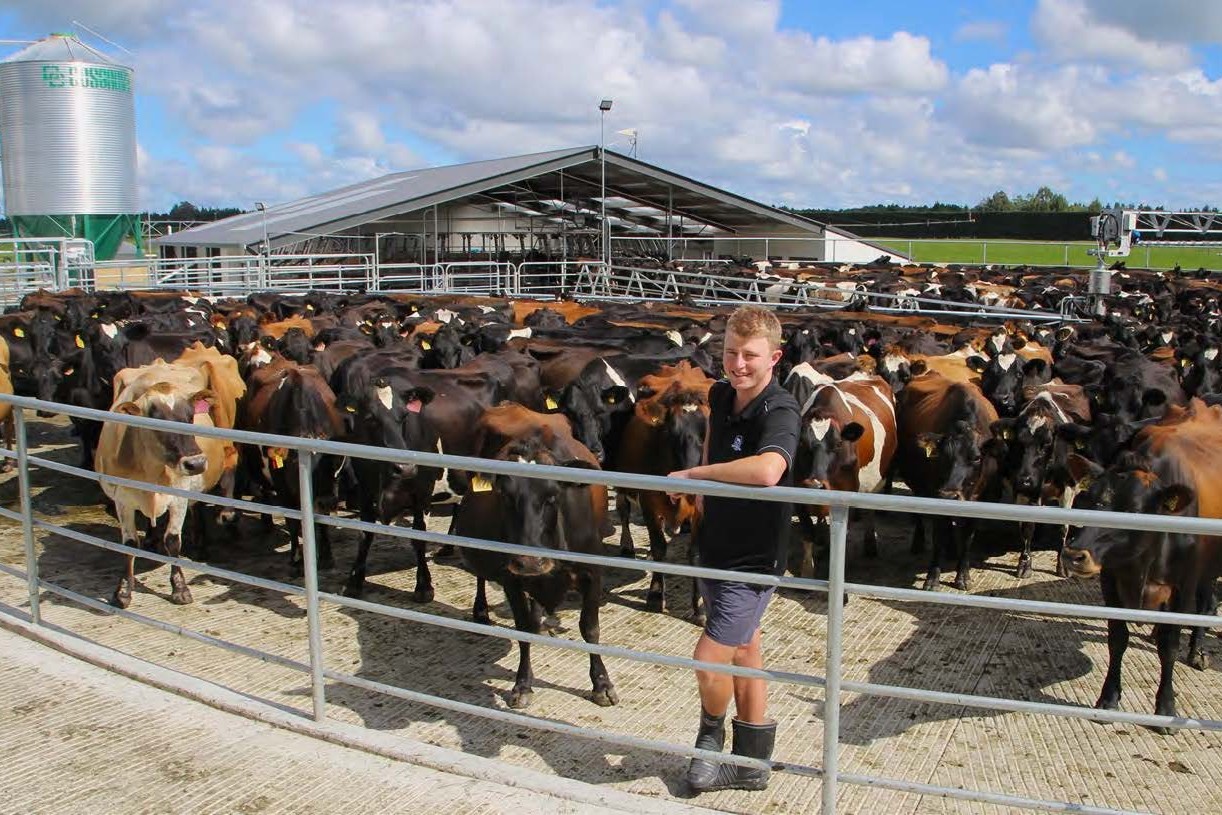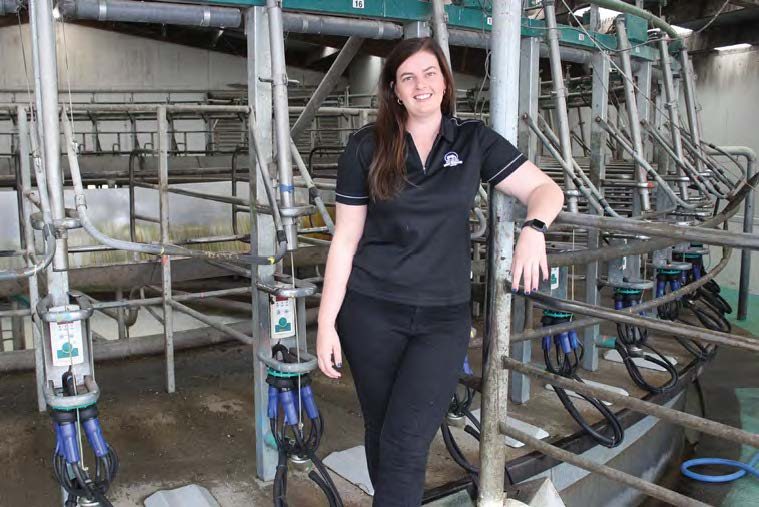Farming on the maunga’s slopes
Hayden & Bridget Goble - Taranaki Share Farmers of the Year. By Jackie Harrigan.
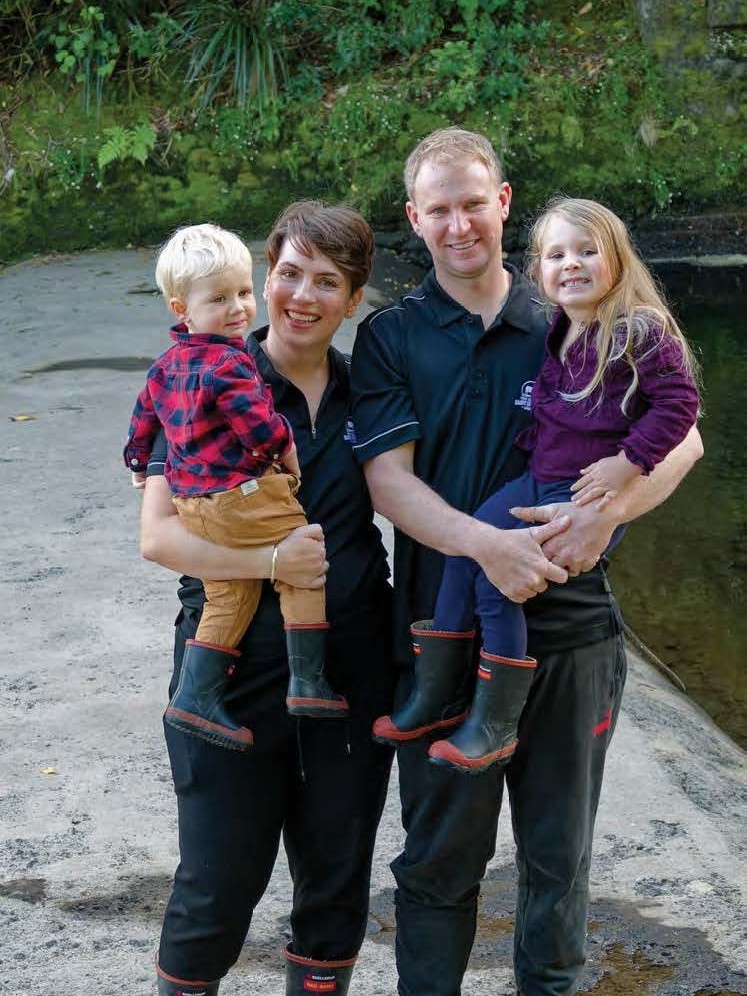
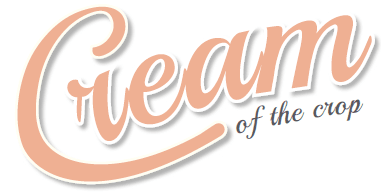
Hayden and Bridget Goble are in the prime busyness of their life – building up their stake in a family farming equity partnership, bringing up a young family and juggling the demands of two busy careers.
The way they have set up their business and are managing the juggle on a high-input farm in coastal Taranaki while managing to engage with their 17 neighbours won them the 2023 Taranaki sharefarmers of the year award.
The couple peak-milk 565 cows at Tataramaika, on the slim strip of coastal dairy land between Oakura and Okato on the flanks of Mount Taranaki.
With the coast on one side and the Pouakai ranges and the maunga on the other, it is stunning scenery but challenging farming country with a different contour in every paddock and rainfall that changes markedly with metres of rise above sea level.
Hayden and Bridget are 20% variable order equity partners in the family business with Kevin Goble and Diane Goble, an equity partnership set up seven years ago with the aim of securing the family farm for following generations, helping Hayden’s two brothers building equity in their own farming and building careers and providing the best vehicle for allowing Hayden and Bridget to lift their ownership stake over time in a simple and transparent manner.
The opportunity was taken after the 2001 consolidation of three small farms into the 200-hectare milking platform to move to a high-input system and upgrade infrastructure with a 50-bail rotary shed with technology included and a covered feed pad installed.
“We looked at different ownership structures but with advice from our accountant, and lots of family discussion, we decided that this company was the best to allow ongoing investment in the farm and business and has many benefits.”
The company was set up with land, cows, shares, machinery, the runoff and a grazing block all included and the couple bought into the whole operation.
They are proud to be in a strong financial position to achieve their goal of full farm ownership.
“We’d like to develop a business with sustainability, to allow opportunity for future generations – either our children or staff,” Bridget says.
“It’s our aim to buy more shares in blocks and we have personal KPIs to keep us on track for achieving this.”
Their target is to lift their holding to 50% over the next seven to 10 years.
The couple believe having their business set up as a company stands them in good stead moving forward and has many benefits.
Formal business meetings with the wider shareholders have been held monthly and now will move to two-monthly.
“We think it’s important for all parties for us to have business meetings separated from Sunday-night shared dinners – it means we can have any harder conversations without affecting our family relationships.”
Hayden graduated from Telford in 2005 with a Diploma in Agriculture and the couple were farming in the Waikato for two years before returning to the Taranaki coast where both their families live. Hayden is paid an operations manager’s wage from the business and Bridget is a doctor, with a specialty in emergency medicine at Taranaki Base hospital.
Managing the juggle
With two small children, Anne, 4 and Leonard, 2, and a baby on the way, the family employ a live-in au pair to help with logistics of childcare and work.
“It’s hard to find a childcare or nanny who will come in at 4.30am when Bridget is on night shift and I am off to milk the cows,” Hayden laughs.
Covid was a difficult time getting anyone into the country but they have managed to make it all work and a new German au pair has just joined them for a six-month stint.
“It’s a bit like inducting a new farm worker – they are doing a very important job looking after and driving our children around, so we take a good week to make sure they are confident and competent in the role.”
Two staff members farm alongside Hayden, and his parents are paid an hourly rate when they help out on the farm too.
Employment and retention of good staff had been difficult over the past couple of years, Hayden said.
“We did have some great team members that stayed four and five years, but lately it has been harder to find the right staff who are committed to the industry and want to stay.
“Everyone seems to be having the same problems and not just in the dairy industry,” he added.
“We have been running a 11:3 roster during calving and try to be flexible for staff – they like to plan their weekends with friends and family, and we support them through training and have events for them.
“We have also been working on having a positive culture in our farm workplace and improving our communications with the team to make sure they are understanding how and why we do things.”
Hayden is looking forward to being involved in a training initiative with the local polytech Level 4 agriculture programme. WITT (Western Institute of Technology at Taranaki) will place two international students paired up on to a farm to live and work there, splitting the week into 20 hours of practical work and 20 hours of study. The two students offset will make a full labour unit and they will get a great practical grounding in farm work.
“It’s a new initiative which will hopefully help train more farm workers in a supported and practical way.”
The challenging employment environment over the last three seasons and recent inflation in farm working expenses and interest rates has prompted Hayden to drop his stocking rate to cut input costs on the System 4 farm after two years of poor maize crops due to cyclones hitting them.
Reducing the herd size from 590 to 565 to constrain costs of bought-in maize silage supplement has also fed into hitting environmental goals and per-cow production has risen from 490kg milksolids (MS)/cow to hopefully reach 495kg MS/cow this season. Overall production was down slightly but so were operating costs – and Hayden is focusing on more efficient cows, saying the Friesians have been getting bigger over the years. Moving to more crossbred genetics for the past few years has resulted in more efficient heifers coming into the herd and better repro results for that age group.
“We have DNAed all the herd and keep really good records over the years so we hope to see our overall repro results continue to improve along with per cow production once the higher efficiency genetics are flowing through the herd.”
Hayden has recently joined a local benchmarking group Dairy Systems Monitoring, set up by BakerAg in the region and is excited about the power of the information shared among the subgroup of seven coastal farmers.
Engaging with the non-farming neighbours
The couple won the Federated Farmers Leadership award for their community engagement, working with their 17 non-farming neighbours to teach them about the dairy industry, inviting groups of visitors to the farm for farm tours (many of them Bridget’s health industry professional expat colleagues) and getting involved with the neighbours around environmental projects.
A local pest-free strategy sees stoat traps positioned on the farm and regular possum trapping programmes and recently they were involved in a joint venture between the Department of Conservation and Fonterra along with Taranaki Regional Council and local iwi groups to work towards removing a historic weir from their adjoining Timaru stream to allow safe fish passage up to the national park.
“The dairy industry has many challenges ahead and needs to be adaptable to thrive,” Hayden says. “We’re looking forward to seeing the technological changes and advances as we adapt to the compliance and regulatory changes.”
Runner-up in the 2023 Taranaki Share Farmer category was awarded to Jack Roper and third placegetter was Gabriel Churi.
